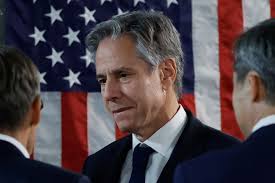Foreign ministers from a dozen Western Hemisphere nations set their sights on ambitious goals to boost the region’s economy at a semiannual meeting in Washington this week, with clean energy, cybersecurity and investments in semiconductors high on their list.
Improved education and food security were also identified as key goals at the meeting on Wednesday of the Americas Partnership for Economic Prosperity, comprising nations from North, South and Central America and the Caribbean. U.S. Secretary of State Antony Blinken hosted the meeting at the State Department.
Jose W. Fernandez, U.S. undersecretary of state for economic growth, energy and the environment, told VOA that the ministers agreed to follow six workstreams, allowing them to move from talks to concrete projects in their bid to make the Americas the world’s most economically competitive region.
Those workstreams are entrepreneurship, digital economy, clean energy, infrastructure, sustainable food production and security, and the rule of law, he said.
The group agreed to “work on bringing investments of semiconductors to Latin America and support small- and medium-size businesses looking for financing that can help them,” Fernandez said in an interview after the meetings.
He added that the ministers “want to better the education in some of the important areas for investors. For example, cybersecurity. Also, we want to help and collaborate with Latin America with clean hydrogen. It’s a subject of interest for the countries in the region, and the United States has the technology needed to support them in that area.”
Uruguay, Chile, Ecuador, Peru, Canada, the United States and Mexico are leading some of the working groups and efforts on different areas. Fernandez said Mexico is preparing a national strategy on clean energy that will be announced soon.
“We’re getting our hands dirty with these projects. We know that there are challenges, but we also know that unless we do this, the region won’t be able to compete as it should with other regions in the world,” he said, stressing the “great appetite on the part of the APEP countries to work together.”
Fernandez said Blinken had laid out for the minister’s ways in which the Americas Partnership Platform, the Inter-American Development Bank, and the U.S. International Development Finance Corporation are providing technical assistance and financing to attract private sector investment in infrastructure across the hemisphere.
“Already, we’ve begun to lay the groundwork for $3 billion worth of high-standard, sustainable, strategically significant projects,” Fernandez said.
Blinken also told the ministers that the initiatives agreed upon Wednesday will have real impact in the economies of each country, including the United States, “by improving the backbone of our supply chain.”
“Better infrastructure will help ensure that the goods our people rely on — semiconductors, electric vehicle batteries, medical supplies — are more affordable, more secure, and made right here in the Americas,” he said.
Beyond the financing of infrastructure and other projects, the ministers are also focused on the need for the rule of law and transparency. On that front, Fernandez, said, the group is working with the Organization of American States, to ensure best practices and weed out corruption in “the procurement of government contracting.”
The undersecretary said the ministers are headed home with two main takeaways, the first being that they are “in a race to create jobs, good jobs, good industries” to secure the future of their countries.
The second is that “there is a desire for concrete projects, not a philosophical discussion, but actual politics that make a difference in the lives of our countrymen.”
Costa Rican Foreign Minister Arnoldo André, whose country will host the leaders of the 12 countries early next year, cited as examples of those concrete projects the creation of an entrepreneur training center in Uruguay and of a center in his own country to develop talent in new industries such as semiconductors.
Projects like these “will have a direct impact on the population who will feel the positive effects on their lives,” he told VOA on the sidelines of a separate event at the Council of the Americas.
He added that Costa Rica next year “will be hosting the 12 countries and any other that joins the alliance to follow up and promote all these important proposals, including all the financial aspects that are being set up by the IDB in collaboration with the U.S. banking system.”
The founding members of the group are Barbados, Canada, Chile, Costa Rica, Colombia, the Dominican Republic, Ecuador, Mexico, Panama, Peru, the United States and Uruguay. (https://www.voanews.com/a/us-latin-american-nations-unveil-strategy-to-boost-the-hemisphere/7704723.html)



































